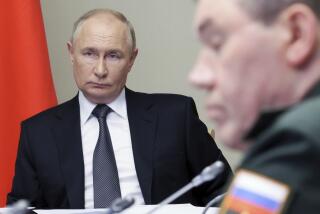Russia Signals Iraq Is Set to Recognize Kuwait
- Share via
MOSCOW — After a month of diplomatic pressure on Iraq, Russia indicated Tuesday that Iraqi leader Saddam Hussein is ready to accept a United Nations demand that Baghdad give formal and legal recognition to Kuwait.
Word of the possible breakthrough came after a two-hour meeting here, arranged at Iraq’s request, between Tarik Aziz, the Iraqi deputy prime minister, and Russian Foreign Minister Andrei V. Kozyrev.
If confirmed by Baghdad, the step could lead to a lifting of U.N. trade sanctions imposed after Iraq invaded Kuwait in 1990 and would ease the tensions caused by sudden Iraqi troop movements toward Kuwait last month.
A cautiously worded statement by the Russian Foreign Ministry said Aziz came here with a letter from Hussein to Russian President Boris N. Yeltsin “on Iraq’s recognition of Kuwait’s sovereignty and borders under U.N. Security Council Resolution 833.”
That resolution was adopted after Kozyrev’s premature announcement Oct. 13 that Hussein would drop Iraq’s claims to Kuwaiti territory. The Security Council demanded that Hussein’s decision be ratified into law by his Parliament, and the Iraqis balked.
After meeting Tuesday with Aziz, Kozyrev rushed to the Kremlin to brief Yeltsin, who then ordered him to Baghdad today “to take part in completing the appropriate constitutional procedures” demanded by the Security Council, the Foreign Ministry said.
There was some skepticism in Russia’s foreign policy Establishment that a deal is done.
“There is no need for Kozyrev to urgently fly to Iraq unless there are reservations and conditions put forth by Iraq,” said Vyacheslav A. Nikonov, chairman of the Russian Parliament’s international security subcommittee.
And even if Iraq finally recognizes Kuwait, the United States has threatened to veto any easing of sanctions unless Hussein’s regime meets U.N. restrictions on its weaponry and keeps its troops away from the border.
“Border recognition would meet only one of a number of requirements with which Iraq has not complied,” State Department spokesman David Johnson said Tuesday.
The United States and Russia are often at odds over Hussein, with Washington taking a hard line and Moscow urging an end to sanctions. Russia’s bullish diplomacy is more than an attempt to recover superpower influence in the Persian Gulf; Iraq owes Moscow $7 billion, mostly for weapons bought before the 1991 Gulf War.
“Our chances to get these dollars back will arise only when Iraq can sell oil, which means lifting the sanctions,” Kozyrev said in a Russian TV interview aired Tuesday.
But he also drew a parallel between Hussein and Palestine Liberation Organization leader Yasser Arafat. “Two, three years ago we told our Western colleagues: Recognize Arafat, we need to show him the way out,” Kozyrev said. “And see, they did move. And now he is not only not a terrorist but a Nobel Peace Prize winner.”
More to Read
Sign up for Essential California
The most important California stories and recommendations in your inbox every morning.
You may occasionally receive promotional content from the Los Angeles Times.










